Art show sees ageing as time for 'adventure' not a story of decline
That’s the message from a new art exhibition at London’s Design Museum, which is intent on smashing ageism with a fresh perspective of old age as time for optimism, "confidence" and "adventure".

This summer’s The Future of Ageing runs until 11 September to reveal stylish prototypes which remind us that we are all ageing. It shows how new ideas can meet the desires of older consumers with "joy".
Based at the Royal College of Art, the exhibition is being promoted with the hashtags #FutureOfAgeing #WeAreAllAgeing and explores how design can support demographic changes in a future with more older people than young.
Ageing not about 'decline and hardship'
Colum Lowe, director at the Design Age Institute, said: “The Future of Ageing display allows us to demonstrate how design and innovation can transform our homes, workplaces, cities, and neighbourhoods to support us as we age.
“Getting older is not a singular story of decline, loneliness, and hardship – it also includes wisdom, maturity, confidence, abundance, and adventure. The venue, scheduling, content, and display design will open up this dialogue to new audiences who possibly haven’t considered the challenges and joys of later life.”
Person born today expected to live to 104

A person born today is expected to live to around 104-years-old, according to the Oxford Institute of Population Ageing. By 2040, over a quarter of the UK’s population will be over the age of 60, but over 70 per cent of us will be fit and healthy with no need for social care or support.
Almost all will be active online and are expected to spend over 20 per cent less on healthcare and more on recreation, culture, and travel. In the next few decades those aged over 55 will account for 63 pence of every pound spent in the UK.
The Design Age Institute believes this presents a massive, untapped market of the 'longevity economy' which requires designers and businesses to move "away from primarily focusing on illness and frailty" to better respond to the "aspirations" of an ageing population.
The 'Centaur' is a self-balancing, two-wheeled personal electric vehicle (PEV) for people with difficulties getting around.
“I want to end the social isolation resulting from reduced mobility. And I believe good design can do that,” said Paul Campbell, design director at Centaur Robotics, which made the Centaur.
On display at the exhibition is ‘Gita’ – a hands-free cargo-carrying robot made by Piaggio Fast Forward, the creators of the iconic Vespa scooter.

The UK National Innovation Centre for Ageing is now considering Gita’s potential impact on the lives of older adults with user groups. “I didn’t expect to fall in love with a robot,” said one user trying out the gadget this year.
To help more older people to work from home, Home Office to Age in Place brings together experts from Northumbria University along with furniture designers to create the Light-Block. The Light-Block offers mobile lighting, power and storage that allows any table to be converted into a proper workstation.
Immersive experiences have been worked into the exhibition to invite visitors to challenge stereotypes and assumptions about later life. Visitors are invited to connect with the diverse stories of older communities and are prompted to consider their own ageing and future selves.
Two short two-minute films (created by production company Chocolate Films) are playing on large screens to show how good design can suit an ageing society. It shows five people talking about their experience of happy and healthy ageing.
The design kollektiv (3D design) and Geoff Williamson (2D design) were briefed to create a practical, portable unit that can transport the exhibition to touring venues around the UK.
The free exhibition is intended to inspire a fresh take on ageing amongst design enthusiasts, students, academics, policymakers, and those interested in technology and innovation.
Based at the Royal College of Art (RCA), whose alumni include Christopher Bailey, David Hockney and Tracey Emin, the Design Age Institute was established in 2020 to support the UK Government’s Grand Challenge on an Ageing Society.
It brings together expertise from the UK's National Innovation Centre for Ageing at Newcastle University, the Oxford Institute of Population Ageing, the International Longevity Centre.
Josephine Chanter, director of audiences at the Design Museum said: “As the world’s leading museum devoted to design, we’re delighted to collaborate with Design Age Institute to present six new research projects that are designed to improve our lives as we age.
“We will all face the challenges that come with ageing, so we hope all our visitors will leave inspired by how designers can enhance the quality of our lives regardless of our age."
Latest News
 29-Jul-24
Dementia Bus gives carehome.co.uk staff insight into life with dementia
29-Jul-24
Dementia Bus gives carehome.co.uk staff insight into life with dementia
 01-Mar-24
Find out the top care homes in 2024
01-Mar-24
Find out the top care homes in 2024
 21-Mar-23
UK's top care homes in 2023 revealed
21-Mar-23
UK's top care homes in 2023 revealed
 03-Jan-23
carehome.co.uk launches free care helpline
03-Jan-23
carehome.co.uk launches free care helpline
 13-Dec-22
5 mins with Emily Whitehurst, chief operating officer for Constantia Healthcare
13-Dec-22
5 mins with Emily Whitehurst, chief operating officer for Constantia Healthcare